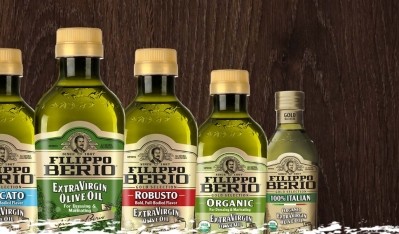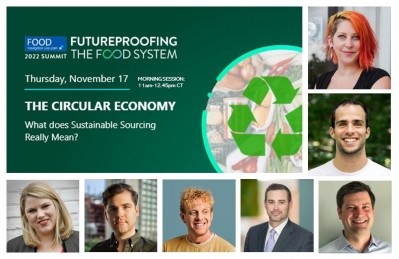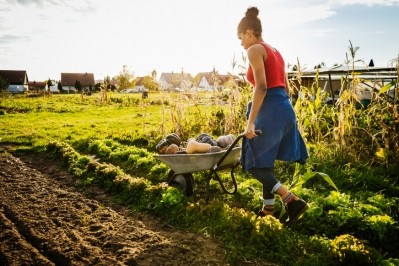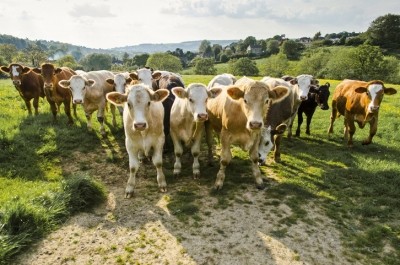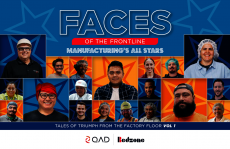Summer Fancy Food Show
Soup-To-Nuts Podcast: ‘We’ve gone past the optional phase’ -- sustainability is mandatory
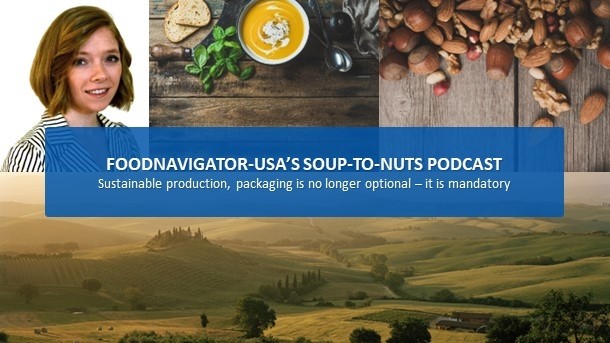
And those that do are not only rewarded with a sense of pride in doing what is right, but often they reap cost savings, earn consumer respect, drive higher sales, and find inspiration for new innovations that keep employees and shoppers engaged at a time when competition for both is heating up.
At the Summer Fancy Food Show in New York City last month, executives with Wyke Farms and Filippo Berio shared how they place sustainability at the center of their business and find environmentally friendly solutions for challenges ranging from ingredient sourcing, production, packaging, distribution and even the end of life for their products. They also share in this episode of FoodNavigator-USA’s Soup-To-Nus podcast, how these opportunities are impacting their top and bottom lines and where else they – and the entire food and beverage industry – still need to progress.
[Editor’s note: Never miss an episode of FoodNavigator-USA’s Soup-To-Nuts Podcast – subscribe today.]
Wyke Farms launches carbon neutral cheddar
For both Wyke Farms and Filippo Berio, environmental sustainability is a part of their corporate DNA – not a side project or a reaction to the worsening climate change or even a response to rising consumer demand. This reflects both their commitments to the planet and underscores a dramatic shift in corporate responsibility, which Rich Clothier, managing director or Wyke Farms describes as no longer optional, but mandatory.
“The days have gone when farmers could say, or businesses could say, ‘Oh, I’m not going to reduce the impact on the environment unless I get more money for it. … I don’t think it’s optional anymore. I think our shoppers expect us and want us to be doing this,” he said.
Wyke Farm’s deep respect for the planet was instilled multiple generations back and reinforced by Clothier’s grandparents – and specifically his grandmother Ivy – who he said often intoned if you look after nature, nature will look after you.
Equally important, according to Clothier, is sharing how the company does this – not just to win consumers and sell more cheese – but to help raise the industry standard and blaze a trail for others in the industry to follow. Which is one reason the company recently created and launched the first carbon neutral certified cheddar cheese, which Clothier proudly noted is named after his grandmother Ivy.
Clothier explains that Wyke Farms opted to work with the Carbon Trust to certify its Ivy’s vintage cheddar as a way to compliment and affirm the stories from the farm it loves to share with consumers.
“The Carbon Trust certification can be a mark of reassurance that backs up some of those qualitative stories,” which are easier for consumers to understand and engage with than stats about grams of carbon reduced per kilo, but both are necessary, Clothier said.
At Wyke Farms, the stories that consumers love to hear include recycling water, generating renewable energy, encouraging biodiversity and using everything the farm has to offer – including manure from the cows.
Clothier said the farm uses 90% less water than most dairy’s its size because it is able to clean and reuse water as well as capture rain water from the roof. Likewise, it uses renewable energy from solar panels and anaerobic digesters, and it encourages wide hedge rows to support biodiversity and natural animal migration.
ROI comes in the form of cost savings
While the process of becoming carbon neutral certified or adopting other new, more sustainable practices can require notable upfront costs, Clothier said they also generate cost savings.
“It can seem initially like there’s quite a bit of front-loaded costs, but actually you can save a lot of costs as well because one thing the carbon footprinting does is it will identify areas of waste and areas for improvement and which also can make the business more efficient as well,” he said.
Filippo Berio sees sustainability as the way to consumers’ hearts
Like Wyke Farms, protecting the planet is embedded deeply in olive oil and traditional Italian food company Filippo Berio, which from its headquarters in the center of a nature preserve is advancing sustainability through new packaging and new products.
At the Summer Fancy Food Show, company CEO Marco de Ceglie explained how Filippo Berio’s 360-degree approach to sustainability is not only better for the planet, but also business.
For example, he said, the company has partnered with the Italian National Institute of Research to pursue three projects to reduce its environmental footprint. The first is studying how to safely reduce pests on the olive trees. The second is exploring how farm technology, such as drones, might enhance farming while reducing the environmental impact. And the third is exploring different cultivars to enhance production while also preserving biodiversity.
“We understand that this the new frontier for consumer products,” but he adds in addition to healthy, great tasting food, consumers increasingly want sustainable options.
Citing data from the Harvard Business Review, de Ceglie noted in more than 90% of CPG categories, sustainably-marketed products grew faster than their conventional counterparts, delivering nearly $114 billion sales. Likewise, 50% of CPG growth from 2013 to 2018 came from sustainability-marketed products.
To meet consumer demand, as well as live its mission of producing and supplying quality olive oil that is produced sustainably, de Ceglie said the company is proud to introduce in the US the first olive oil bottle made with 50% recycled PET to reduce reliance on virgin plastic and also create market demand for the material that will in turn encourage more consumers to recycle.
He adds this is just the starting point and he hopes to increase the percentage of recycled material and the variety of bottles using it.
Currently, sourcing recycled PET is more expensive than virgin plastic, which de Ceglie acknowledged “is sort of stupid,” but he noted it also is driving higher purchase intent. According to company research, purchase intent among key demographics of interest increased 27 percentage points for the new recycled PET bottle.
In addition, nearly three-quarters of Gen Z consumers surveyed by the company said they would pay more for sustainable items, with the majority willing to pay a 10%price premium. The company notes the same would apply to 50% of Millennials, 34% of Gen Xers and 23% of Baby Boomers.
From Sustainable Select to organic to plant-based – sustainable options abound
The company also is improving the sustainability of what is inside its products, with the launch of a new collection of Sustainable Select olive oil, which de Ceglie explains are fully traceable and certified sustainable.
Each of the olive cultivars used in the collection’s oils offer a unique taste profile and experience, according to the company, which describes the Smooth Harmony olive oil as delivering hints of fresh grass, thistle and tomato with a slightly spicy aftertaste. The Hearty Balance product is fruitier with medium intensity, scents of grass and a slightly leafy taste.
Beyond these oils, the company also is expanding its organic and plant-based offerings with a new organic classic pesto, an organic glaze with balsamic vinegar of Moderna, an organic balsamic vinegar of Moderna and new organic flavored extra virgin olive oils. It is also expanding its plant-based offerings with the launch of two vegan pestos – a basil and sun-dried tomato option that substitute tofu for the parmesan. All of which are made with more sustainable production methods.
These launches and the new packaging are part of a much larger effort to improve the company’s sustainability, which is outlined in more detail in the company’s 2020 Sustainability Report. The report is scheduled to be updated every two years with the next report slated for publication this year.
As illustrated by Wyke Farms and Filippo Berio, the ways in which the CPG industry is moving the needle towards sustainability are diverse and progress is exponential with innovative solutions reducing packaging and emissions and new farming techniques that not only protect but rebuild the earth.
